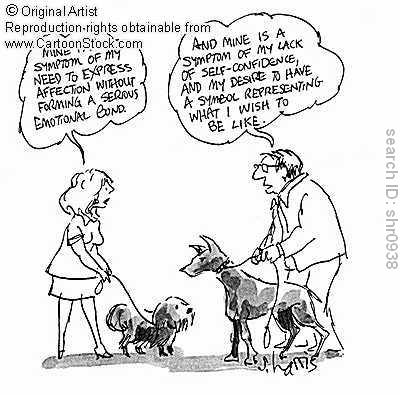Serendip is an independent site partnering with faculty at multiple colleges and universities around the world. Happy exploring!
The Dog and its Tail
Towards Day 24 of Evolving Systems course

I. coursekeeping
* welcome back! (relevant stories upcoming....!)
*last series of conferences this week (Erin, Paige, Meredith tomorrow a.m.; Karina, Summer, Olivia, Aimee and Prianna in p.m.) and next: come having reviewed your paper, ready to talk about it and the next one: ALSO to think w/ me about revising one of them for your final project
* by tomorrow night, post your afterthoughts about today's conversation, which will form our talking points for Thursday's class
(part of the time in company w/ Jane McAuliffe--any preparation for that? someone explain the course to her??)
* Friday evening your next paper is due, reflecting some more on the implications of unconscious processes in the construction of stories
* review of what else is ahead of us: papers, performances, portfolios...
II. a few relevant stories, as we continue to
muse about the workings of the unconscious....
Kirsten: My mother always tells me that I have to "get out of that poisonous part of my brain" But how?
Sarah: as I thought of the paper I'll have to have done for Friday. Maybe something on chemical interactions with the brain, and how medications (or delicious poultry) can make you do things you weren't consciously planning on doing. it's a really interesting (and almost terrifying) concept. That's almost a way your brain tells stories, isn't it?
Aimee: For my [adopted] grandmother, the visit from her father was very real and very precious, even if the entire experience was a story that her brain had fabricated...Last spring, I underwent nursing assistant training in a long term care facility. I cared for residents with dementia and grew accustomed to their frequent delusions and hallucinations....I was puzzled by their hallucinations. Why does a regressing brain concoct such odd, frightening stories? If the brain is becoming progressively debilitated, shouldn't it lack the ability to create such stories?
schu: I tried once to memorize using the theory: make funny and weired stories... Then the memories stick in my head, and it becomes really easy to memorize everything. You can use it for history class. But the real thing going on here is to break through the regular practice of memory. We get used to the regular things, but when a weired, or abnormal, or illogical or funny thing happens, we tend to memorize it in a better way. Also, another trick is that memories are linked with one another. The connection you made lead you to remember one thing to another.
Lemon Koala: Firstly, is the brain a separate object from our identities? Secondly, do we want to be certain about our future?
Paige on "the inside story" of the brain
Trace Haidt's argument: very gutsy to say that 50 years of psychology/moral philosophy has been a study of fantasies/post-hoc constructions, not origins of behavior
Bingqing: In The Emotional Dog and Its Rational Tail, the author said that moral judgment tells people something is right or wrong without telling them why. Thus, when moral helps us make decision, it is an unconscious process. Rather than justice which people establish from carefully reasoning, moral can be innate.
challenge to notion (Descartes et. al.) that
we are consciously in control of our behavior
most behavior emerges from us...
and then we think up an explanation
descriptive, not a prescriptive project
though my BIG question (one I'd like to talk w/ Jane McAuliffe about!) is how this might affect the way we think about education (Bryn Mawr's structure, our own way of going about it?)
"A correct understanding of the intuitive basis of moral judgment may...be useful...in helping educators design programs (and environments) to improve the quality of moral judgment and behavior" (815).
"attempts to directly teach thinking and reasoning in a classroom setting generally show little transfer to activities outside of the classroom" (829).
(but let's back up, start w/ your reactions to the story of incest between siblings....)
moral intuitions come first and directly cause moral judgments
moral reasoning is an ex post facto process,
(slow, "cool," "more cognitively expensive") rationalization
of (quick, "hot," "cheaper") gut feeling
(aesthetic? derive from sentiment?)
"moral dumbfounding"
reasoning is rarely used to question one's own attitudes or beliefs
moral reasoning is usually done interpersonally
rather than privately
yet: "my-side bias," "makes-sense epistemology":
find conclusion that fits prior beliefs
effortful search may feel like introspection,
but is actually a one-sided search for "a priori causal theories"
two illusions:
We believe our moral judgment is driven by our moral reasoning
AND/analogously
we expect successful rebuttal of opponent to change their mind:
as if forcing a dog's tail to wag by moving it
with our hand will make the dog happy (!)
explicates bitterness, futility, and self-righteousness
of most moral arguments
Metaphors have entailments:
much moral argument involves trying to
get the other person to apply the right metaphor
(designed to trigger intuitions)
Social intuition emergent, from inside out, not outside in...
third-party norm enforcement:
humans keep track of who did what to whom/monitor one another
selective loss of intuitions (parallel to phonology!):
specialize in subset of moral potential
(in a space of possibilities,
you will lose what you are not exposed to)
"maintenance-loss" models of autonomy/community/divinity
attempts to directly teach thinking and reasoning
in a classroom setting generally show
little transfer to activities outside (!!!!!!!!)
principal difficulty in objective moral reasoning:
biased search for evidence
seek out discourse partners to trigger conflicting intuitions
most cognition occurs outside of consciousness
Cf. "Failing Home Economics":
"rational decisions are those you...don’t regret later.”
What does/might this have to do w/ the education ahead of you??



